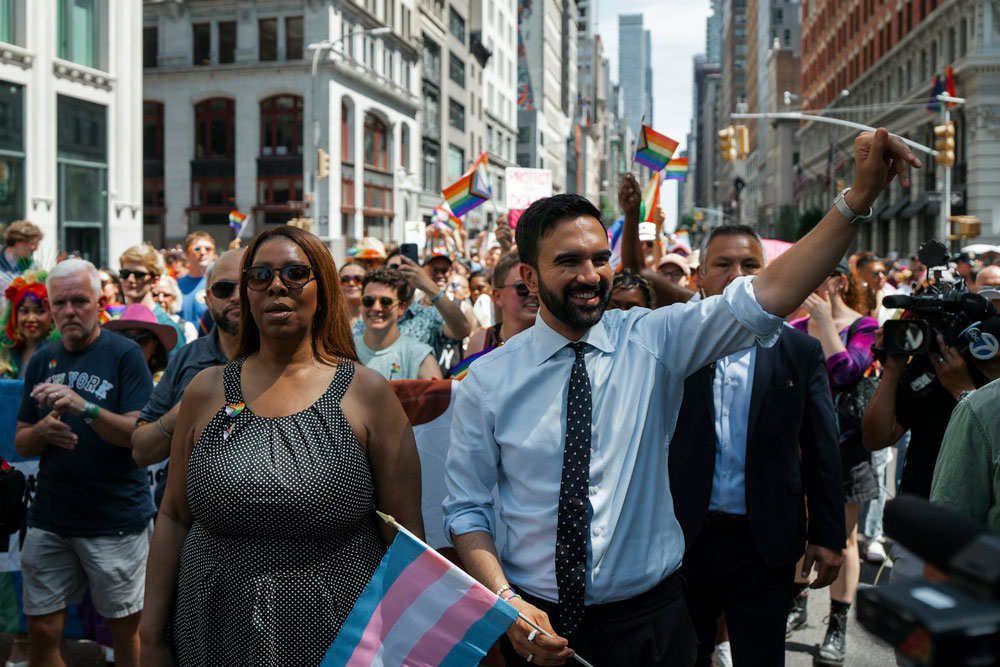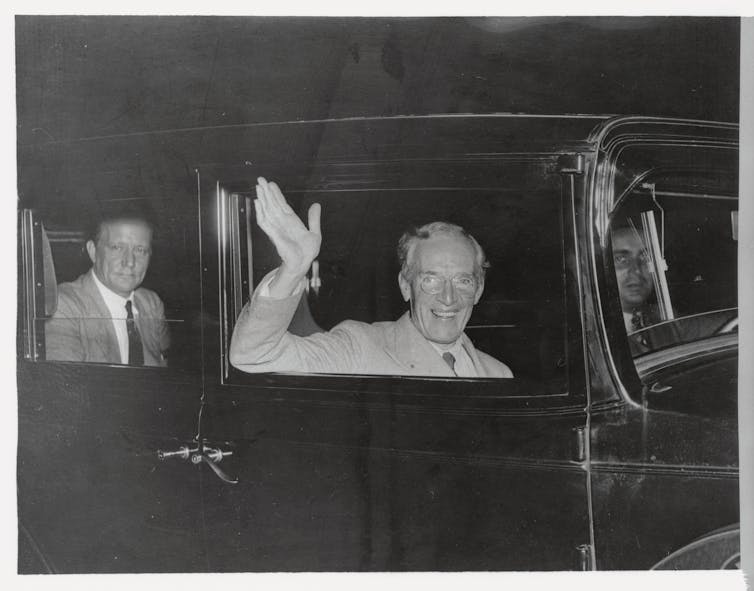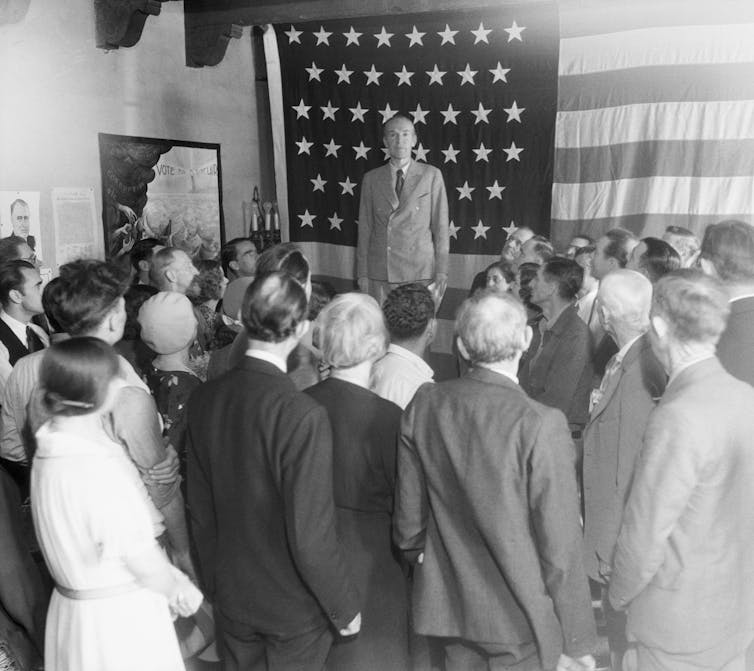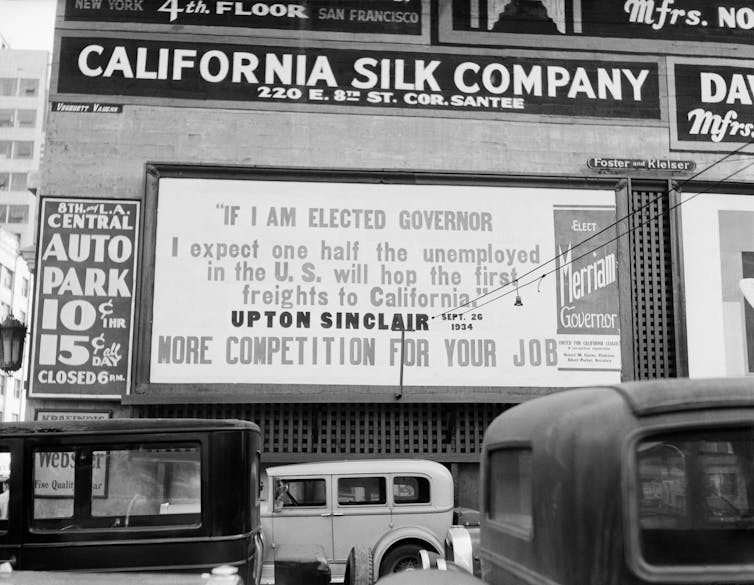
By James N. Gregory
It has happened before: an upset victory by a Democratic Socialist in an important primary election after an extraordinary grassroots campaign.
In the summer of 1934, Upton Sinclair earned the kind of headlines that greeted Zohran Mamdani’s primary victory on June 24, 2025, in the New York City mayoral election.
Mamdani’s win surprised nearly everyone. Not just because he beat the heavily favored former governor Andrew Cuomo, but because he did so by a large margin. Because he did so with a unique coalition, and because his Muslim identity and membership in the Democratic Socialists of America should have, in conventional political thinking, made victory impossible.
This sounds familiar, at least to historians like me. Upton Sinclair, the famous author and a socialist for most of his life, ran for governor in California in 1934 and won the Democratic primary election with a radical plan that he called End Poverty in California, or EPIC.
The news traveled the globe and set off intense speculation about the future of California, where Sinclair was then expected to win the general election. His primary victory also generated theories about the future of the Democratic Party, where this turn toward radicalism might complicate the policies of the Democratic administration of Franklin D. Roosevelt.
What happened next may concern Mamdani supporters. Business and media elites mounted a campaign of fear that put Sinclair on the defensive. Meanwhile, conservative Democrats defected, and a third candidate split progressive votes.
In the November election, Sinclair lost decisively to incumbent Gov. Frank Merriam, who would have stood less chance against a conventional Democrat.
As a historian of American radicalism, I have written extensively about Sinclair’s EPIC movement, and I direct an online project that includes detailed accounts of the campaign and copies of campaign materials.
Upton’s 1934 campaign initiated the on-again, off-again influence of radicals in the Democratic Party and illustrates some of the potential dynamics of that relationship, which, almost 100 years later, may be relevant to Mamdani in the coming months.

Bettmann/Contributor/Getty Images
California, 1934
Sinclair launched his gubernatorial campaign in late 1933, hoping to make a difference but not expecting to win. California remained mired in the Great Depression. The unemployment rate had been estimated at 29% when Roosevelt took office in March and had improved only slightly since then.
Sinclair’s Socialist Party had failed badly in the 1932 presidential election as Democrat Roosevelt swept to victory. Those poor results included California, where the Democratic Party had been an afterthought for more than three decades.
Sinclair decided that it was time to see what could be accomplished by radicals working within that party.
Reregistering as a Democrat, he dashed off a 64-page pamphlet with the futuristic title I, Governor of California and How I Ended Poverty. It detailed his plan to solve California’s massive unemployment crisis by having the state take over idle farms and factories and turn them into cooperatives dedicated to “production for use” instead of “production for profit.”

Bettmann/ Contributor/Getty Images
Sinclair soon found himself presiding over an explosively popular campaign, as thousands of volunteers across the state set up EPIC clubs – numbering more than 800 by election time – and sold the weekly EPIC News to raise campaign funds.
Mainstream Democrats waited too long to worry about Sinclair and then failed to unite behind an alternative candidate. But it would not have mattered. Sinclair celebrated a massive primary victory, gaining more votes than all of his opponents combined.
Newspapers around the world told the story.
“What is the matter with California?” The Boston Globe asked, according to author Greg Mitchell. “That is the farthest shift to the left ever made by voters of a major party in this country.”
Building fear
Primaries are one thing. But in 1934, the November general election turned in a different direction.
Terrified by Sinclair’s plan, business leaders mobilized to defeat EPIC, forming the kind of cross-party coalition that is rare in America except when radicals pose an electoral threat. Sinclair described the effort in a book he wrote shortly after the November election: “I, Candidate for Governor: And How I Got Licked.”
Nearly every major newspaper in the state, including the five Democratic-leaning Hearst papers, joined the effort to stop Sinclair. Meanwhile, a high-priced advertising agency set up bipartisan groups with names like California League Against Sinclairism and Democrats for Merriam, trumpeting the names of prominent Democrats who refused to support Sinclair.
Few people of any party were enthusiastic about Merriam, who had recently angered many Californians by sending the National Guard to break a Longshore strike in San Francisco, only to trigger a general strike that shut down the city.

Bettmann /Contributor/Getty Images
The campaign against Sinclair attacked him with billboards, radio and newsreel programming, and relentless newspaper stories about his radical past and supposedly dangerous plans for California.
EPIC faced another challenge, candidate Raymond Haight, running on the Progressive Party label. Haight threatened to divide left-leaning voters.
Sinclair tried to defend himself, energetically denouncing what he called the “Lie Factory” and offering revised, more moderate versions of some elements of the EPIC plan. But the Red Scare campaign worked. Merriam easily outdistanced Sinclair, winning by a plurality in the three-way race.
New York, 2025
Will a Democratic Socialist running for mayor in New York face anything similar in the months ahead?
A movement to stop Mamdani is coming together, and some of what they are saying resonates with the 1934 campaign to stop Sinclair.
The Guardian newspaper has quoted “loquacious billionaire hedge funder Bill Ackman, who said he and others in the finance industry are ready to commit ‘hundreds of millions of dollars’ into an opposing campaign.”
In 1934, newspapers publicized threats by major companies, most famously Hollywood studios, to leave California in the event of a Sinclair victory. The Wall Street Journal, Fortune magazine and other media outlets have recently warned of similar threats.
And there may be something similar about the political dynamics.
Sinclair’s opponents could offer only a weak alternative candidate. Merriam had few friends and many critics.
In 2025, New York City Mayor Eric Adams, who abandoned the primary when he was running as a Democrat and is now running as an independent, is arguably weaker still, having been rescued by President Donald Trump from a corruption indictment that might have sent him to prison. If he is the best hope to stop Mamdani, the campaign strategy will likely parallel 1934. All attack ads – little effort to promote Adams.
But there is an important difference in the way the New York contest is setting up. Andrew Cuomo remains on the ballot as an independent, and his name could draw votes that might otherwise go to Adams.
Curtis Sliwa, the Republican candidate, will also be on the ballot. Whereas in 1934 two candidates divided progressive votes, in 2025 three candidates are going to divide the stop-Mamdani votes.
Religion also looms large in the campaign ahead. The New York City metro area’s U.S. Muslim population is said to be at least 600,000, compared to an estimated 1.6 million Jewish residents. Adams has announced that the threat of antisemitism will be the major theme of his campaign.
The stop-Sinclair campaign also relied on religion, focusing on his professed atheism and pulling quotations from books he had written denouncing organized religion. However, a statistical analysis of voting demographics suggests that this effort proved unimportant.
![]()
James N. Gregory is Professor of History at the University of Washington.





























Samuel L. Bronkowitz says
The democratic establishment had united against Mamdani harder than they’ve united against donald trump.
Pogo says
@Professor Gregory
Sincerely, I’m completely sympathetic to your POV, respectful of your own achievements and scholarship — including your pedagogic acumen. I regard Zohran Mamdani equally well.
Would you care to expound on the presidency of Henry Wallace?
https://www.google.com/search?q=henry+a+wallace
Or more recently: President Ralph Nader?
A musical finale: